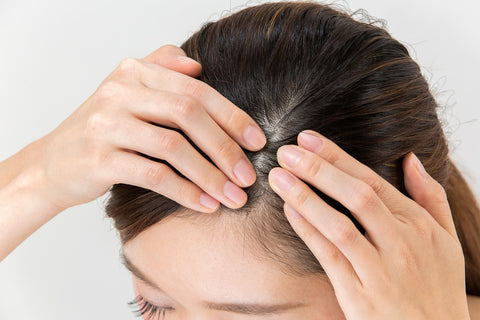 Dealing with an itchy, flaky scalp can be frustrating, but understanding the nuances of scalp psoriasis can empower you to effectively manage the condition and find relief.
Dealing with an itchy, flaky scalp can be frustrating, but understanding the nuances of scalp psoriasis can empower you to effectively manage the condition and find relief. In this blog post, we will explain the intricacies of scalp psoriasis, its symptoms, causes, and ways to address it, along with a focus on CLn Shampoo as an innovative skincare solution for those suffering from scalp psoriasis.
Unveiling Scalp Psoriasis Symptoms
Scalp psoriasis can manifest in various ways, with symptoms that range from subtle to more pronounced. You might notice reddish patches on your scalp, some of which can be barely noticeable while others may appear thick and inflamed. The characteristic flaking and silvery-white scales are common, often resembling dandruff. However, there's a key distinction: scalp psoriasis produces a dry scale and a silvery sheen that differentiates it from ordinary dandruff.
The dryness can escalate, leading to cracked and even bleeding skin on the scalp. Itching is a hallmark symptom, varying from mild discomfort to intense sensations that can disrupt daily life and sleep patterns. Scratching, a natural response to itching, can aggravate the condition by causing bleeding and making the patches larger and thicker. Additionally, a burning sensation or soreness might accompany the condition, contributing to the overall discomfort.
Understanding Scalp Psoriasis Causes
Scalp psoriasis is an autoimmune disease, characterized by an overactive immune response that accelerates the production of skin cells. This rapid turnover results in thick, discolored plaques on the scalp and surrounding areas, including the hairline, forehead, neck, and skin around the ears. While the exact trigger remains elusive, genetic predisposition is a contributing factor. Having a family history of psoriasis increases the likelihood of developing the condition.
Who Does Scalp Psoriasis Affect?
Scalp psoriasis is a condition that can affect anyone. However, certain factors might make you more susceptible. Lifestyle habits such as alcohol consumption and smoking, along with stress and obesity, are among the contributing factors. Individuals with other autoimmune diseases are also at an increased risk of developing scalp psoriasis.
The Importance of Choosing the Right Shampoo for Scalp Psoriasis
When dealing with scalp psoriasis, finding the right shampoo goes beyond mere hygiene – it's a critical step in managing your condition effectively and improving your overall quality of life. The right shampoo can make a significant difference in alleviating symptoms, promoting scalp health, and boosting your confidence. Let's explore why selecting the appropriate shampoo is essential for individuals with scalp psoriasis.
- Targeted Relief for Symptoms: Choosing a shampoo specifically formulated for scalp psoriasis can provide targeted relief for symptoms. Such shampoos are designed with ingredients that help soothe the scalp, reduce inflammation, and alleviate itching. By addressing these symptoms directly, you can experience much-needed comfort and relief.
- Gentle Cleansing without Aggravation: Conventional shampoos can sometimes contain harsh ingredients that may aggravate sensitive scalp conditions like psoriasis. These ingredients can strip the scalp of natural oils and disrupt the skin barrier, exacerbating the symptoms. In contrast, shampoos designed for scalp psoriasis are formulated to offer gentle cleansing without causing further irritation.
- Promoting Scalp Health and Healing: The right shampoo can contribute to promoting scalp health and aiding in the healing process. Ingredients like antioxidants, vitamins, and natural extracts may be incorporated to nourish the scalp, support cell turnover, and encourage skin repair. These properties are especially important for individuals with scalp psoriasis, as the condition involves abnormal skin cell growth.
Introducing CLn Shampoo: A Solution for Scalp Psoriasis
Amidst the sea of shampoos available, CLn Shampoo stands out as a solution designed to address the unique needs of individuals with scalp psoriasis. Its formulation focuses on effectively cleansing the scalp, eliminating flakes, and soothing discomfort. What sets CLn Shampoo apart is its commitment to being gentle, free of potential irritants, and compatible with various skin types. With CLn Shampoo, you're opting for a product that understands the intricacies of scalp psoriasis and aims to provide holistic relief and care.
Additionally, CLn Shampoo is a fragrance-free option that ensures a pleasant usage experience. Its ingredients are carefully selected to avoid common irritants, making it suitable for various skin types. Free of steroids, antibiotics, parabens, and triclosan, CLn Shampoo aligns with the brand's commitment to creating products that prioritize both effectiveness and skin health.
